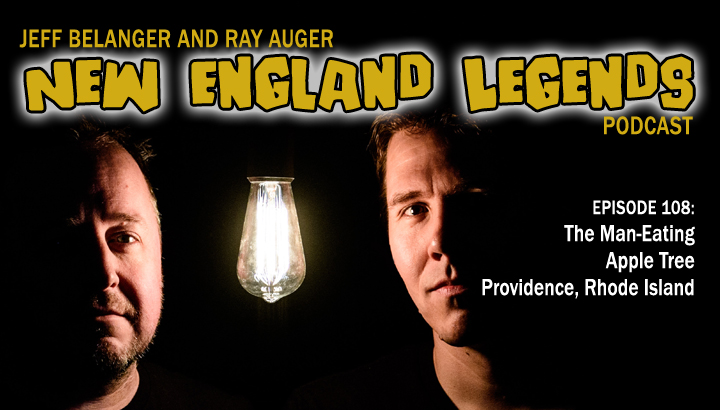
In Episode 108, Jeff Belanger and Ray Auger dig through the history of Providence, Rhode Island, in search of the roots of the story behind a man-eating apple tree that devoured state founder Roger Williams. In 1860, Rhode Island historians exhumed the body of Williams and made a gruesome discovery.
WANT TO SEE IT?:
John Brown House Museum – 52 Power Street, Providence, Rhode Island 02906. Tel: 401-273-7507
CALL (OR TEXT) OUR LEGEND LINE:
(617) 444-9683 – leave us a message with a question, experience, or story you want to share!
BECOME A LEGENDARY LISTENER PATRON:
https://www.patreon.com/NewEnglandLegends
CREDITS:
Produced and hosted by: Jeff Belanger and Ray Auger
Edited by: Ray Auger
Additional Voice Talent: Tim Weisberg.
Theme Music by: John Judd
SUBSCRIBE TO THE PODCAST FOR FREE:
iTunes | Google Play | Spotify | Stitcher | TuneIn | iHeartRadio
JOIN OUR SUPER-SECRET:
New England Legends Facebook Group
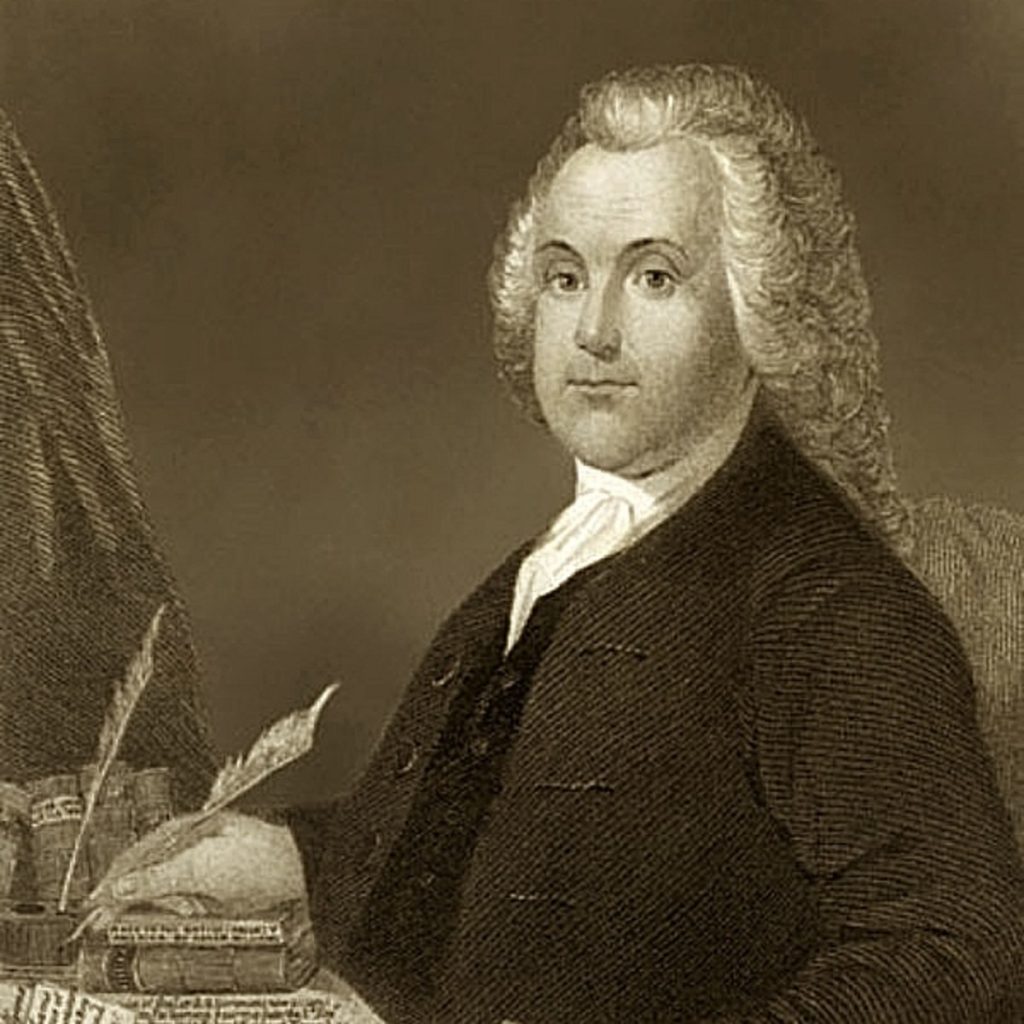
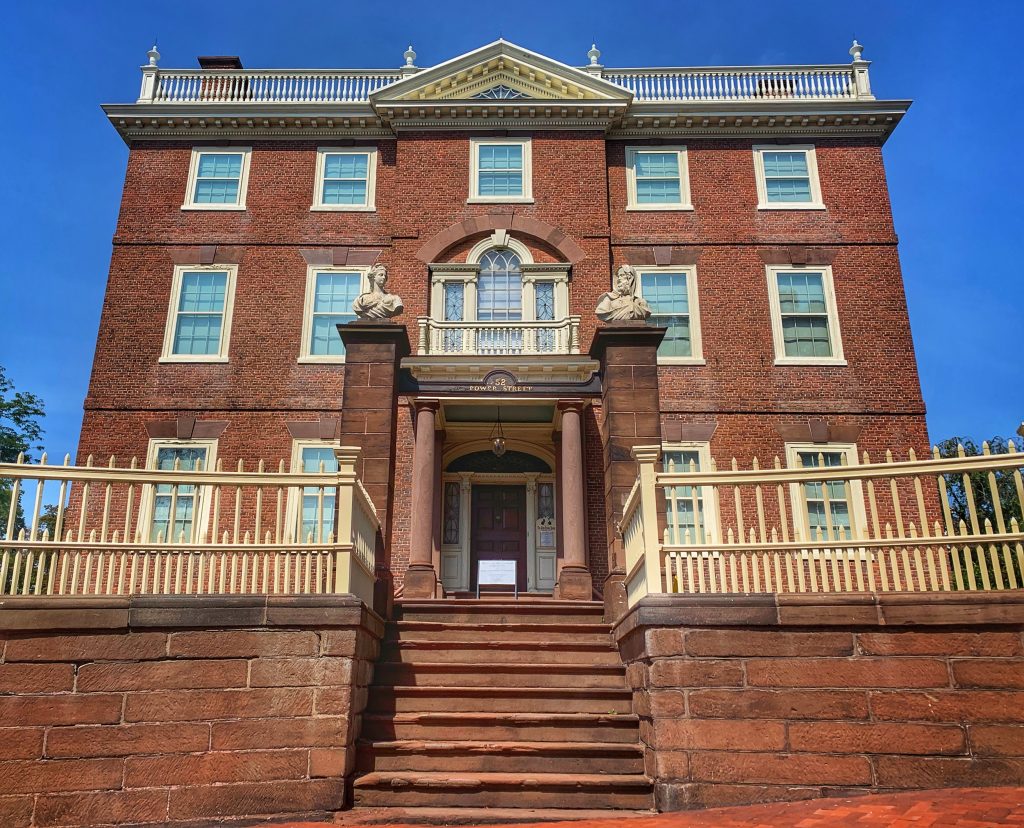
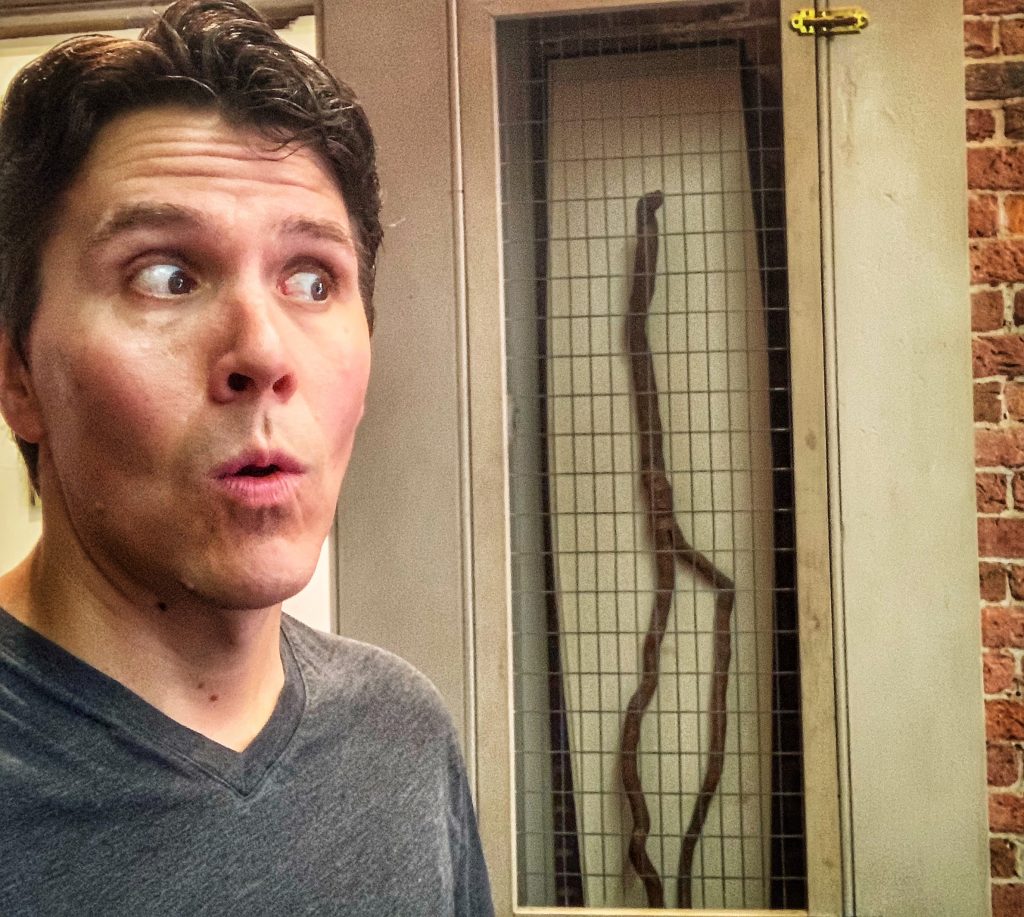
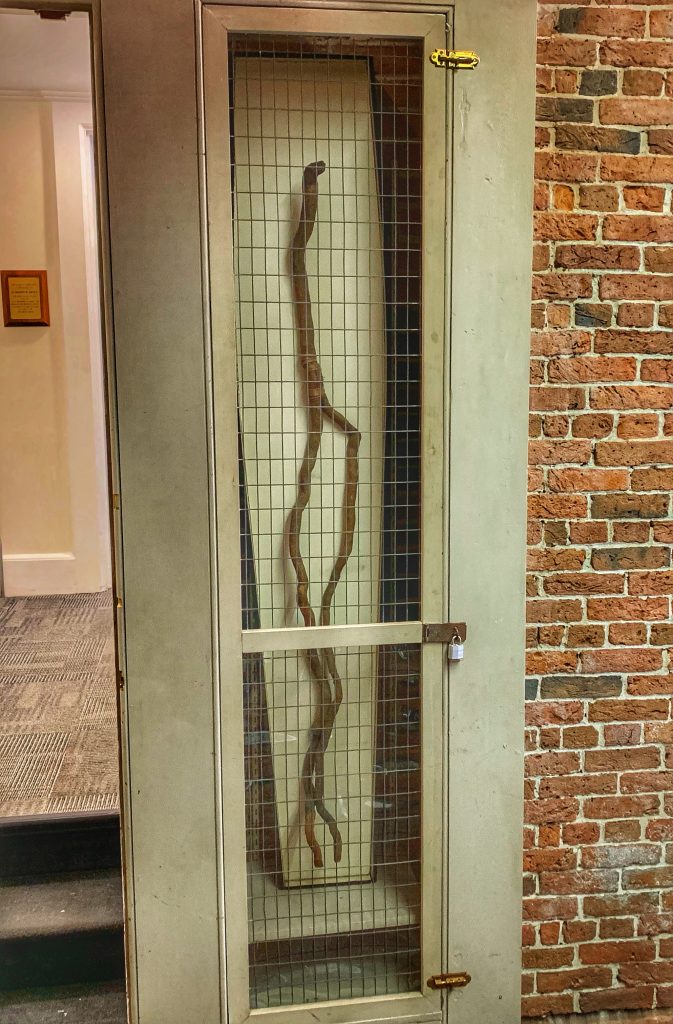
EPISODE TRANSCRIPT:
*A note on the text: Please forgive punctuation, spelling, and grammar mistakes. Like us, the transcripts ain’t perfect.
JEFF: Ray, it’s September in New England, and you know what that means.
RAY: Of course! It means football, pumpkin spice everything, the leaves will soon be changing…
JEFF: (INTERRUPTING) Right, all those things, but it also means it’s apple picking season.
RAY: Of course! We take the kids almost every year.
JEFF: We do too. I love eating an apple picked right from the tree.
[SFX CRUNCHING AN APPLE]
RAY: I’m with you.
JEFF: You know, this week’s legend involves an apple tree.
RAY: Then why are we in downtown Providence, Rhode Island? Should we be in an orchard somewhere?
JEFF: Because it’s inside the old John Brown House that we’ll find what’s left of the apple tree that ate a man.
RAY: What?!
JEFF: Not just any man, either. This apple tree ate Rhode Island founder, Roger Williams.
[INTRO]
JEFF: Hello, I’m Jeff Belanger.
RAY: And I’m Ray Auger, and welcome to episode 108 of the New England Legends podcast. If you give us about ten minutes, we’ll give you something strange to talk about today.
JEFF: Thank you for joining us on our mission to chronicle every legend in New England one week and one story at a time. And we can’t do that without the help of our Patreon Patrons who are sponsoring this week’s episode. If you’d like early access to new episodes, plus bonus content and episodes that no one else gets to hear, head over to patreon.com/newenglandlegends and consider helping us out. You decide what these stories are worth to you each week. 108 weeks in a row without missing one, I might add. Basically, we work for you. It’ll cost you less than the price of one beer per month, and your support goes a long way in keeping us going and growing.
RAY: That it does. We also love it when you reach out to us. You can call or text our legend line anytime at 617-444-9683, reach us through our web site at ournewenglandlegends.com, or through our super-secret Facebook group.
JEFF: We’re going to take a second here to respond to two bits of feedback we’ve received this past week. The first came in the form of a review posted on iTunes—which we appreciate.
RAY: (INTERRUPTING) And we read every one of them.
JEFF: We do. This review reads: Great podcast! Wish you did more Vermont stuff.
RAY: We also got an email from Joe R. this week that said, “I enjoy your podcast while at work. I noticed you leave Massachusetts high and dry. Why is that?”
JEFF: Someone also told me recently that he likes our podcast best when we do Rhode Island stories.
RAY: Is this the part where we explain that our episodes regularly rotate through the six New England states, so if you hear a Vermont story today you’ll hear another in six more weeks?
JEFF: Or… we could leave it a mystery….
RAY: I vote we leave it a mystery. Okay, Jeff, let’s get back to this apple tree you mentioned. You expect me to believe that an apple tree ATE a man?
JEFF: That’s what they say.
RAY: And not just any random dude, we’re talking about Roger Williams.
JEFF: Right.
RAY: The founder of Rhode Island, Roger Williams.
JEFF: The very same.
RAY: And we’ve come to the historic John Brown House on Power Street in Providence looking for answers?
JEFF: We have. This is where our story ends. It begins back in 1631. Let’s head there now and set this up.
[SFX TRANSITION]
RAY: It’s the winter of 1631 in Boston, Massachusetts, when this radical preacher named Roger Williams arrives from England. He’s a Puritan now, but he didn’t used to be. He was originally ordained in the Church of England, but felt the church was abusing its power, so he converted. Like so many others, he came to America to escape religious persecution and to start a new life.
JEFF: When we say “radical,” we’re speaking in relative terms here.
RAY: Right. Roger Williams is radical because he believes in religious freedom for all people, he’s tolerant of other peoples’ views, and he’s very much against the confiscation of Native American land.
JEFF: That’s indeed radical for the time. Another fun fact about Roger Williams is he’s really good with the spoken word. He’s one of those rare people who easily pick up new languages, so in the new world he finds many Native people willing to teach him their words. He’s making friends, not necessarily Puritan friends. They think he’s nuts.
RAY: Boston doesn’t want him, so he heads to Plymouth, Massachusetts, looking for a place to preach. That doesn’t last long, so he makes his way up to Salem. Maybe they’re open to his more liberal views?
JEFF: But he soon finds out… they’re not. By October of 1635, Massachusetts Bay Colony has had enough of the radical Roger Williams, thank you very much, so he’s banished.
RAY: Roger travels south to Narraganset Bay, and with the help of his new Narragansett friends, he forms his own colony at the junction of two rivers by the bay.
JEFF: Roger preaches his ideas that we need to be more tolerant. We shouldn’t steal land from Native peoples, and church and state should remain separate. With a wall between the two. Always. He IS a radical. In these early days of his new colony, he’s preaching to an almost empty room. But soon, a few folks start to wander in.
[SFX SMALL CROWD FORMING MUMBLING]
RAY: It turns out there are plenty of Puritans feeling a little disenfranchised, and Roger’s message is hitting home. More and more people move down to this growing community and Roger Williams’ new church and community are looking like a success.
JEFF: But Roger is quick not to take any of the credit. After all, he answers to a higher power. He views the success of his community as God shining down his good grace. That’s when Roger Williams thinks of the perfect name for his town.
[SFX ANGELIC MUSIC]
JEFF: Providence. In the summer of 1643, Roger makes a trip to England to obtain a charter for his settlement. The charter for “The Providence Plantations in Narragansett Bay,” is approved. Roger Williams is now legit.
RAY: In Providence, Roger Williams founds America’s first Baptist church. He edits the first written dictionary of Native American languages. He serves as Governor of the Colony from 1654 to 1658, and he continues to preach his ideas of the sovereignty of Native lands, but one radical preacher can only do so much. As the decades pass, New England is growing so fast that tensions with Native peoples only gets worse.
JEFF: By the time King Philip’s War erupts in the region in 1675, Roger is an old man. And he’s broken hearted at the atrocities happening around him.
RAY: Roger lived to see most of Rhode Island burn during the war, and he lived to see much of it rebuilt. By the time he passes away around 1683, he’s a somewhat-forgotten figure in the region. He’s already a distant memory to the people of the colony. Roger is buried in his family plot in Providence without too much fanfare, and would have been forgotten if something peculiar didn’t happened almost a century later. Something that would change everything.
JEFF: That thing would be the American Revolution. You see, these smart guys are sitting in a room looking for good ideas to put into these new documents called the United States Constitution and the Bill of Rights. The early framers loved Roger Williams’ ideas about a wall of separation between church and state. Suddenly, Roger Williams is elevated from an almost forgotten figure, to an example of an early patriot with the right idea.
RAY: He’s consider the founder of Rhode Island and he influenced the founding documents of a new country. Not bad. Though Roger’s been dead for a hundred years, his legend just got a shot in the arm.
JEFF: From here we’re going to jump ahead to 1860. And things are about to get weird. The legend of Roger Williams has grown to the point where Rhode Island is feeling downright proud of the old radical. Some folks figured it’s high time he receive a proper memorial.
RAY: So on March 22nd, people from the community go searching for Roger Williams’ resting place. Williams was buried in a family plot on his property. As for the exact spot, local historians have a pretty good idea.
REPORTER: He is supposed to have been buried near Benefit Street in the rear of the house of the late Sullivan Dorr, a few feet from the stable door near an ancient apple tree. This spot is now covered by the finished cap of a heavy stone pillar.
JEFF: That is pretty clear. The folks intend to exhume his body and move it to a more appropriate place where the public can pay their respects to the founder of Rhode Island. So they dig.
[SFX DIGGING]
JEFF: They soon get down to the coffin of Roger Williams. They open the lid.
[SFX CREAKING DOOR]
JEFF: And are shocked by what they see.
REPORTER: A singular incident was discovered on uncovering the bottom of Roger Williams’ grave. The root of an apple tree had turned out of its way to enter it at the head. Following the position of the body to the thighs, it divided and followed each leg to the feet, tender fibers shooting out in various directions. By nature’s prompting it had sought and taken up the chemical deposits of the body and turned them into blossoms and fruit. As the apples which grew on the tree were doubtless eaten by people in adjoining houses, and by marauding boys, as it their custom, it follows naturally that the essences of Roger Williams must have been absorbed by a multitude of people. The conundrum has been propounded by various local philosophers: Who ate Roger Williams?
RAY: I think I’m gonna be sick. So what do the local historians do with the remains of Roger Williams?
JEFF: Not ones to miss an opportunity, they gather up the bones, AND they gather up the apple tree root and bring them back to the Rhode Island Historical Society. And that will bring us back to today.
[SFX TRANSITION]
JEFF: So here we are at the John Brown House museum, the same John Brown for which Brown University is named, and we’re going inside to see one of the most gnarly historic displays in the world.
[SFX DOOR OPEN AND CLOSE FOOTSTEPS ON HARDWOOD FLOOR]
RAY: This is kind of awesome. There’s a coffin-shaped display case, and inside is a root maybe five feet long that starts as one piece at the top, then splits to two about one-third of the way down. (PAUSE) So these are the roots of the tree that ate the remains of Rhode Island founder, Roger Williams?
JEFF: That’s what they say. The old newspaper accounts claimed the roots sought out the nutrients in the rotting corpse of Roger Williams. In a way… eating him.
RAY: So the founder of our nation’s smallest state has had one strange afterlife.
JEFF: The smallest state, but the longest name of all the U.S. states. Though it’s rarely used, the official name is still: State of Rhode Island and Providence Plantations.
RAY: That’s right! And who knows how many people ate the apples that grew from that tree by Roger’s grave.
JEFF: In a way, Roger Williams is a part of all of us. How do you like them apples?
[SFX APPLE CRUNCH]
[OUTTRO]
RAY: I like them quite a lot.
JEFF: If you enjoy our podcast each week, please consider posting a review of our show on Apple Podcasts, and tell a friend or two about our show. It really helps us quite a lot.
RAY: We’re getting story ideas for you guys all the time now, and we love that! Please keep them coming, we’re always looking into new strange-but-true tales from New England, like this one about a tree that ate Roger Williams.
JEFF: And so you don’t think we’re taking too many liberties with the story, those descriptions of the exhuming of Roger were taken right from newspaper accounts.
RAY: All the news that’s fit to print. We’d like to thank Tim Weisberg for lending his voice acting talents this week, and our theme music is by John Judd.
JEFF: Until next time remember… the bizarre is closer than you think.
Copyright © 2019 New England Legends. All rights reserved.

Loved this one especially cause of Timothy lending his voice!! Great job guys keep it up !!! Jeff cute ending